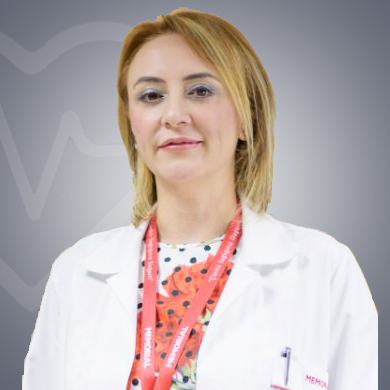
Obstetrician & Gynecologist
Memorial Ankara Hospital , Ankara, Turkey20 Years of experience
Speaks: English
Here is a list of some of the conditions a Gynecologist Laparoscopic Surgeon like Aygul treats:
Endometriosis is a common condition that affects most many women in their childbearing years. Surgical removal of the uterus with or without removal of the ovaries is often preferred to treat endometriosis related to pelvic pain or the growth of nearby tissues.
You must see a Gynecologist Laparoscopic surgeon if you have any of the below-listed symptoms:
The above symptoms can be mild or severe and hint at a wide range of gynecological conditions. You should not panic if you experience any of the above symptoms. Many conditions are effectively treated. Living with pain or stress regarding the symptoms is unnecessary. If your symptoms indicate a serious health concern, consult a gynecologist for proper diagnosis and treatment. Post diagnosis, the doctor will start suitable treatment.
Dr Aygul can be consulted from 11 am to 5 pm. The doctor is available for consultation and follow-ups 5 days a week. But the doctor is available on all days of the week for emergency cases. gynecologist generally works for 40-50 hours in a week and sees around 20-25 patients daily.
Dr Aygul performs a number of popular procedures listed below:
Persistent ovarian cysts and cysts that are causing some prominent symptoms sometimes need to be surgically removed. Also, surgery is also recommended if there are chances that the cyst can be cancerous or can become cancerous.

Share Your Experience about Dr. Aygul

Gynecologist Laparoscopic Surgeons are specialists who perform a wide variety of tests focused on women's health. They are responsible for performing exams on adult women to check their reproductive health. During the exam, the doctor physically examines the woman, performs STD test, does a breast exam, and monitors use of birth control. Gynecologists sometimes are certified as obstetricians, who look after the health of the mother and the child during pregnancy. A Gynecologist Laparoscopic Surgeon also studies the condition of the patient iin order to design the treatment plan. They also diagnose problems that women might be having with the reproductive organs, like polycystic ovarian syndrome and cervical cancer. They also check vaginal infections or urinary tract infections in women. A Gynecologist Laparoscopic Surgeon can even perform minimally invasive surgeries.
A Gynecologist Laparoscopic Surgeon orders or performs the below-given tests to confirm gynecologist conditions:
Every condition has different signs and symptoms. An individual might not show the same set of signs for a condition and the severity of symptoms may also vary. You need to see a gynecologist if you have persistent symptoms. The doctor will perform some tests to detect the condition and plan the treatment as per the diagnostic report.
You need to visit a Gynecologist Laparoscopic Surgeon for your regular screening. You must see the doctor also if you experience symptoms like lesions, vaginal pain, abnormal bleeding in the uterus, and vulvar and pelvic pain. Some other symptoms that warrant a visit to a Gynecologist Laparoscopic Surgeon are listed below: